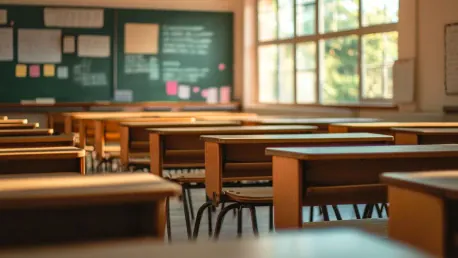The recent presidential debate between former President Donald Trump and Vice President Kamala Harris covered a wide array of topics, yet conspicuously overlooked K-12 education, an issue of undeniable importance on the American agenda. Despite the discussion spanning areas like the economy, abortion, immigration, housing, and race, the absence of dialogue on education stood out, particularly given Trump’s controversial proposal to eliminate the Department of Education. Education professionals and advocates have expressed their frustration over this omission, arguing that the debate missed a critical opportunity to address pressing educational challenges that have far-reaching implications for the nation’s future.
The State of American K-12 Education
Many education professionals have highlighted the urgent need for substantial discourse on the state of K-12 education in the United States. Margo Roan, an educator, emphasized that only three out of ten students can read at their grade level, signaling a dire need for intervention and support. Chalkbeat, an education policy website, also lamented the glaring absence of key educational issues from the debate, particularly those pertaining to pandemic recovery for students, school safety, college affordability, and job preparedness. These are not minor concerns; they are pivotal issues that significantly impact students’ futures and, by extension, the future of the country.
The debate’s neglect of educational topics seemed even more alarming in light of recent data from the National Assessment of Educational Progress (NAEP), which reported a decline in literacy scores among 4th and 8th graders from 2019 to 2022. This troubling trend underscores the necessity for immediate and rigorous policy-making and interventions to prevent further academic decline. Ignoring such crucial data and avoiding the conversation about education essentially disregards the mounting obstacles that the American education system faces. The conspicuous absence of a thorough discussion on K-12 education policies from both candidates indicates a significant gap in addressing one of the country’s most urgent issues.
Perspectives from Educators and Advocates
Sarah Carpenter, the executive director of Memphis Lift, voiced substantial criticism about the debate’s focus on sensationalist topics at the expense of substantive educational discourse. She argued that by sidelining education, the debate effectively neglected one of the most crucial components of America’s future successes – its human capital. Public education, a backbone of American society, forms the foundation upon which the nation’s promise of opportunity and upward mobility rests. Carpenter and many others believe that without significant attention to and investment in public education, this promise remains unfulfilled for millions of students.
Frustration within the education community and among advocates was palpable. The consensus was clear: the debate represented a missed opportunity to address the urgent educational needs of American students and teachers. The lack of a thorough discussion on education policies from either candidate was disheartening. Harris’s policies, which focus on making college more affordable and protecting LGBTQ+ students, were mentioned, but without in-depth analysis. Meanwhile, Trump’s radical approach of dismantling the Department of Education to delegate power to the states received scant scrutiny. This oversight signifies a broader disregard for the national implications of education policy decisions.
The Implications of Ignoring K-12 Education
The recent presidential debate between former President Donald Trump and Vice President Kamala Harris touched on numerous important issues yet notably failed to address K-12 education. This is a key aspect of the American agenda. Despite tackling topics like the economy, abortion, immigration, housing, and race, the glaring omission of education was particularly significant, especially considering Trump’s controversial suggestion to abolish the Department of Education. This exclusion did not go unnoticed. Education professionals and advocates have voiced considerable frustration, arguing the debate ignored an essential subject that shapes the nation’s future. They believe that the omission represents a missed chance to discuss and address the numerous educational challenges facing the country today, which have profound implications for the next generation. The debate could have provided a valuable platform for discussing reforms and improvements in the educational system, yet this critical issue was left out, leaving many educators and citizens disappointed.









